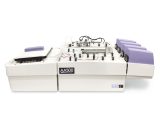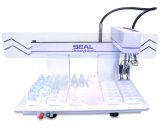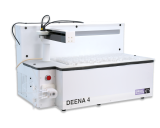Total Kjeldahl Nitrogen (TKN)
Enhance your TKN digestion and analysis with SEAL Analytical's automated nutrient analyzers and digestion systems, achieving the low detection limits needed for regulatory compliance while keeping up with throughput demand. Reliable TKN analysis is essential for monitoring nitrogen pollution, optimizing soil health, and ensuring compliance in environmental, agricultural, and commercial applications.
Why is TKN Analysis Important?
Total Kjeldahl Nitrogen (TKN) analysis is a fundamental aspect of environmental, agricultural, and industrial testing, providing critical insights into nitrogen levels and their impacts. In environmental analysis, TKN is crucial for monitoring water quality, assessing nutrient pollution, and ensuring regulatory compliance in wastewater, river monitoring, and industrial discharge. By measuring organic nitrogen (and inorganic ammonia), TKN analysis helps track pollution sources, optimize wastewater treatment processes, and prevent eutrophication in natural water bodies.
In agriculture, TKN analysis supports soil fertility management and precision farming by quantifying total nitrogen available for crops. It is also vital for ensuring fertilizer quality and understanding nitrogen uptake in plant tissues, enabling sustainable agricultural practices. Industrial applications, such as tobacco testing and effluent monitoring, also rely on TKN analysis to maintain product quality, comply with environmental standards, and minimize nitrogen pollution.
SEAL Analytical’s automated solutions for TKN testing simplify workflows and deliver high-quality results for diverse applications. Our BD50 and BD28 for automated Kjeldahl digestion along with our discrete analyzers and continuous flow analyzers for automated TKN analysis provide a comprehensive approach to efficient, accurate testing. Following common reference methods such as EPA 351.2 and Standard Methods 4500-N(org), SEAL systems streamline TKN analysis while meeting regulatory requirements. Explore our solutions for automating TKN workflows and see how we can elevate your laboratory’s
What's the Automation Advantage?
| 1. Increased Efficiency and Throughput: Automating TKN analysis significantly reduces manual workload by streamlining time-consuming steps like digestion, distillation, and detection. With the ability to process high sample volumes, laboratories can handle increasing demands without sacrificing precision or extending turnaround times. | 2. Multi-Parameter Testing: Automated systems allow laboratories to measure multiple analytes, such as ammonia, nitrate, and nitrite, on a single platform alongside TKN. This flexibility minimizes the need for additional instruments, simplifies workflows, and optimizes laboratory resources. | |
| 3. Enhanced Accuracy and Reproducibility: Automation eliminates variability from human error, ensuring precise digestion conditions, consistent reagent delivery, temperature, and reaction times, and reliable calibration for every run. This leads to more reproducible results, which are essential for meeting regulatory standards and maintaining data quality. | 4. Time Savings for Analysts: Automated TKN systems free analysts from repetitive tasks, allowing them to focus on critical responsibilities such as data interpretation and lab management. Features like automatic start-up, shutdown, and real-time monitoring enable true walk-away operation, improving overall productivity. |
SEAL's Expertise in Automated TKN Analysis
With over 60 years of experience in automating nutrient testing methods, SEAL Analytical has set the standard for precision and reliability in Total Kjeldahl Nitrogen (TKN) analysis. Our legacy traces back to the first automated nutrient analyzers: the AutoAnalyzer and AutoAnalyzer II, originally developed by Technicon and later refined by Bran+Luebbe, which formed the foundation for many EPA-approved nutrient testing methods still in use today. SEAL’s modern AutoAnalyzer product line continues this tradition of innovation, combining proven methodologies with advanced automation to meet the evolving needs of environmental, agricultural, and commercial laboratories.
SEAL Analytical offers both continuous flow analyzers and discrete analyzers, ensuring that laboratories can select the technology that best suits their workflows, sample types, and analytical requirements. This flexible approach ensures that we prioritize the unique needs of each lab, rather than promoting a one-size-fits-all solution. Complementing our analyzers, SEAL’s BD50 and BD28 block digestion systems provide reliable, automated digestion solutions. Designed specifically for Kjeldahl digestion, these blocks deliver even heating across the entire sample rack, ensuring complete and consistent digestions in every digestion tube.
Our team of chemists and leaders with strong scientific backgrounds ensures that every SEAL product is engineered to streamline complex processes and deliver high-quality performance. Whether supporting environmental compliance, optimizing agricultural nutrient testing, or enhancing industrial quality control, SEAL Analytical’s history, expertise, and customer-focused solutions make us the trusted choice for automated TKN analysis.
Key TKN Methods and Features
SEAL Analytical’s expertise in Total Kjeldahl Nitrogen analysis covers a wide range of approved methods, providing unmatched support for environmental water testing, wastewater analysis, nutrient monitoring, and beyond. Our instrumentation automates methods according to 40 CFR 136 and other regulatory guidelines. Common reference methods for SEAL's TKN method library include:
In addition to the analysis of Total Kjeldahl Nitrogen, SEAL Analytical offers automated solutions for Kjeldahl digestion with the BD28 and BD50 automated digestion systems. These blocks utilize a controller to automatically complete each step of the Kjeldahl digestion, allowing for unattended sample preparation for Total Kjeldahl Nitrogen.
Our continuous flow analyzers also offer inline distillation and gas diffusion, allowing for even further automated sample preparation for TKN testing. Some matrices, such as wastewater or soil, may benefit from inline dialysis offered on our continuous flow analyzers, capable of automating consistent, effortless pre-dilutions while also providing sample cleanup and removal of interferences and particulates.
Beyond TKN detection, SEAL Analytical’s discrete analyzer and continuous flow analyzer product lines support an array of automated processes, including dilution, auto-calibration, automatic QC insertion, auto-spiking, and the sequential or simultaneous analysis of multiple parameters. By combining these powerful features with regulatory-approved methods, SEAL Analytical ensures your lab’s Total Kjeldahl Nitrogen analysis is not only compliant and efficient, but also capable of delivering precise and accurate results.
Compare our Analyzers
Explore the capabilities of each of our product lines below. Our analyzers and robotic systems are capable of analyzing a wide variety of analytes on a single platform. Select a product line to learn more about the capabilities of each system.
Ready to Optimize Your TKN Analysis?
Request Information
Fill out the form below to request information about our products and services.


.png?resolution=160x128&quality=95)

